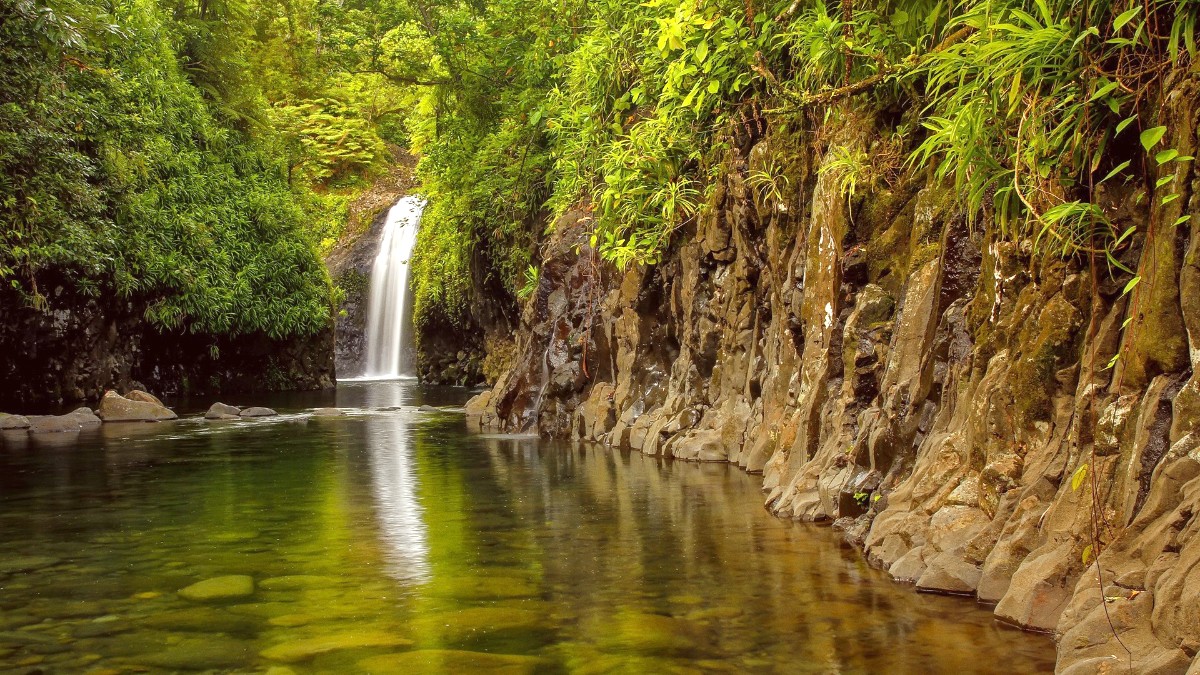
Fiji
Vodafone Fiji and Digicel Fiji are the main mobile providers, with good coverage in populated areas. Buying a SIM card at Nadi International Airport upon arrival is the best option; staff assist with activation and data plans. SIM cards are inexpensive (FJ$10-20), and data bundles are generally affordable (e.g., 5GB for FJ$20-30), offering an economical way to stay connected.
English and Fijian are official languages; Hindi is also common. English is widely spoken in tourist areas. Learning a few basic Fijian phrases shows appreciation and fosters positive interactions. Google Translate can be helpful (download Fijian pack for offline use). Rosetta Stone can assist in learning languages.
Shops typically open 8 AM or 9 AM to 5 PM or 6 PM, Monday to Saturday. Somosomo Market operates early morning until mid-afternoon, Monday to Saturday, with Saturdays being busiest. Resort restaurants keep standard meal times; local eateries have varying hours. ATMs are scarce on Taveuni; one might exist at Matei Airport or a large resort, but reliability varies.
Fiji observes various public holidays (Christian, Hindu, Muslim, secular), which might lead to limited services or business closures. Check the official Fiji public holiday calendar for your travel year. Sunday is a traditional day of rest and church for many Fijians; many services might close or have reduced hours. Plan accordingly for transport and dining outside resorts.
Plan your cash needs in advance. Taveuni has limited ATM access, and many local businesses are cash-only. Withdraw enough Fijian Dollars at Nadi Airport or Savusavu.
ATMs are scarce; carry sufficient cash. No major bank branches on Taveuni.
Not traditional in local eateries. Resorts may have communal staff tip boxes.
No specific airport services on Taveuni; plan funds from Nadi. Priority Pass for lounges. Compensair for flight disruptions.
Taveuni's natural terrain and developing infrastructure present challenges for travelers with mobility needs. Infrastructure is limited. Many paths are unpaved, uneven, or feature steps. Public transport (Lomabuses) is not accessible due to its design.
Very few attractions are truly accessible. The first waterfall at Bouma National Heritage Park features a relatively flat path, but subsequent falls are not. Private transfers can arrange more flexibility and direct access compared to public transport.
Older resorts might lack ramps or elevators. Newer or larger resorts might feature some accessible elements, but direct confirmation is always wise. Inquire about room layouts, ramps, and shower facilities when booking.
Beyond the immediate locale, explore more of Taveuni's natural and cultural offerings.
Qamea Island offers rainforest walks and secluded beaches away from Taveuni's main tourist areas. Its less-explored interior presents a different hiking experience. The Somosomo Strait is a vast marine park, with dive and snorkel trips exploring its renowned coral reefs.
Village visits on Qamea provide a distinct view of Fijian life, often more private than on Taveuni. Explore agricultural areas on Vanua Levu to observe sugar cane plantations and local farming, to the regional economy.
Older resorts or guesthouses might lack ramps or elevators. Newer or larger resorts might feature some accessible elements, but direct confirmation is always wise. Inquire about room layouts, ramps, and shower facilities when booking.
Public transport (Lomabuses) lacks accessibility. Private transfers can arrange more flexibility and direct access. Discuss specific needs with private transfer operators to confirm they cater to appropriate access.
Before visiting a village, ask your resort or guide about proper etiquette, including appropriate dress and how to present a sevusevu (traditional gift). This preparation shows genuine respect.
Fiji's environment is pristine, and sustainable practices are encouraged.
Taveuni's natural terrain and developing infrastructure present challenges for travelers with mobility needs. Infrastructure is limited. Many paths are unpaved, uneven, or feature steps. Public transport (Lomabuses) is not accessible due to its design.
Waste management on Taveuni is a challenge, with very limited recycling infrastructure. Travelers are urged to minimize waste by using reusable items and avoiding single-use plastics. While rainfall is abundant, fresh water can be strained; water conservation is .
Many Taveuni resorts promote eco-tourism with rainwater harvesting, solar power, and waste reduction. Choose dive operators dedicated to reef preservation. Support ethical tour operators like G Adventures.
Some airlines offer carbon offset programs. Support local reforestation projects in Fiji. Purchase sustainable outdoor gear from Patagonia. Offset your travel footprint with Terrapass. Consider donating to The Rainforest Site.
Dress modestly in villages and religious sites (shoulders and knees covered). Always ask permission before taking photos of people. Remove hats and shoes when entering a village or home. Do not touch a Fijian's head. Participate respectfully in ceremonies like kava. Sunday is a day of rest; avoid loud activities.
Prioritize the privacy and dignity of individuals. If someone declines a photo, respect their decision immediately. For children, obtain permission from an adult. Be mindful of cultural sensitivities at sacred sites where photography might be prohibited.
Community-based tourism initiatives, like those at Bouma and Vidawa, help preserve local culture and traditions by integrating them into tourist experiences. This approach provides direct economic benefits to communities, fostering cultural continuity through traditional ceremonies.